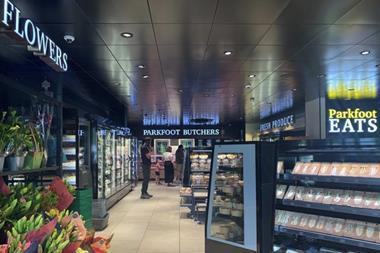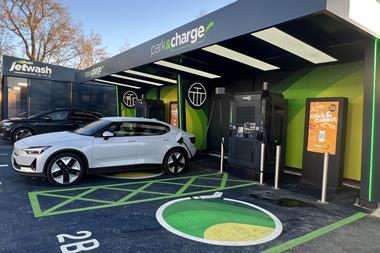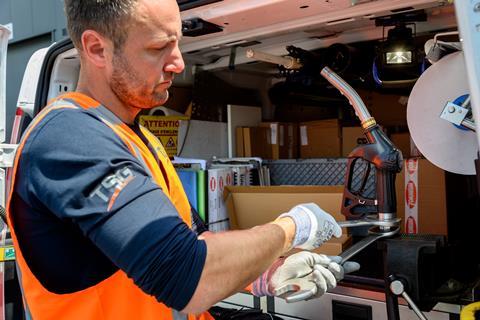
Despite the presence of a great convenience store or super-fast EV chargers, for many people the main reason they go to a service station is to fill up with petrol or diesel. And for them, nothing is more of a headache than seeing those brightly coloured plastic, out-of-service signs.
Paul Davidson, operations director at TSG UK, says: “There is never a good time for a dispenser to break down, as invariably the resulting downtime is much longer than the downtime required for scheduled maintenance. Adopting an ‘if it isn’t broken don’t fix it’ attitude and relying solely on reactive maintenance leaves the site vulnerable to added costs and lost profits.”
With costs spiralling across the business, the expense of a service and maintenance contract may seem like just too much at the moment. But Davidson believes regular maintenance can lengthen the lifespan of dispensing equipment and ultimately lower costs.
“An emergency repair is typically very expensive, especially if it involves waiting for spare parts to be delivered, which subsequently prolongs dispenser downtime and increases disruption to the business. Reactive maintenance generates more emergency repairs and may cause permanent damage to the dispenser, hampering performance down the line and leading to premature replacement.
“Keeping costs under control is a significant benefit of planned maintenance management, as business owners can allocate their maintenance budget more effectively, ensuring each dispenser receives the requisite level of service to remain fully operational at all times.”
Davidson adds that by proactively scheduling maintenance, site owners can significantly reduce the risk of their equipment failing and consequently relax, safe in the knowledge that they have taken the necessary precautionary measures to sustain operational uptime.
“With effective maintenance management, the equipment will receive proper care and inspections, which identify potential problems before they become serious issues. During the service, the equipment will be cleaned and lubricated, with the replacement of any parts showing signs of excessive wear. All of these activities help to keep the equipment running smoothly and efficiently, minimising failure rates and reducing depreciation.”
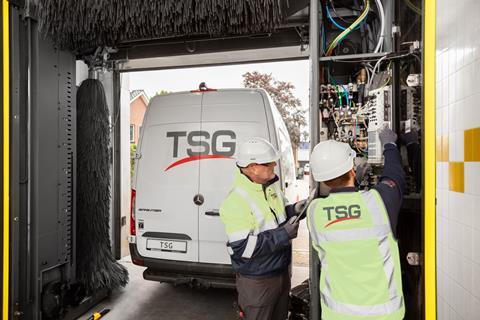
Best match
TSG customers can choose a service and maintenance arrangement that best matches their business needs – and budget. For instance, a five-day maintenance plan between the normal working hours of 8am to 5pm may be sufficient for smaller operations. Larger networks may prefer a six or seven-day scheme, with the option to upgrade to a 24/7 call-out service if required.
“Emergency cover can be crucial for busy sites to help maintain the smooth flow of traffic through the station and avoid congestion at peak times,” says Davidson. “One call to the TSG customer services team and a technician can be on the premises within a four-, six- or eight-hour time frame, depending on the terms laid out in the agreement. For emergency responses, whether they be health and safety or operational issues, our service team will respond immediately and will aim to make safe or resolve the problem within a few hours.”
In addition, Davidson says many site issues, such as a faulty pos system or inaccurate tank gauge, can be identified and resolved remotely by TSG’s diagnostic specialists. “Remote diagnostics are becoming more commonplace in the industry as new technological advancements are radically changing the way we work. In some instances, the fault can be diagnosed before the technician visits the site, resulting in less disruption for the staff and alleviating equipment downtime.”
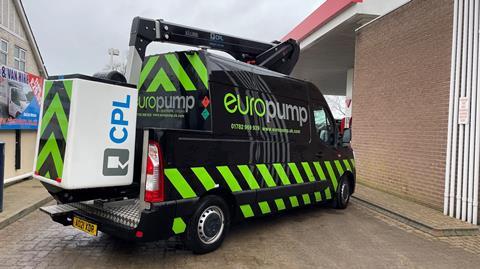
Combining services
Another way of keeping service and maintenance costs as low as possible is by combining services into a single visit. That’s the opinion of Jack Aplin, Eurotank Service Group’s group sales director.
“There are certain maintenance tasks that have a higher cost level due to the specialist equipment required to complete them so it’s best to make good use of it and get as many tasks as possible done at the same time.
“A cherry picker van, for example, is costly to have on site so when you have one coming to complete fuel system compliance services such as your annual vapour recovery check and adjustment, it’s a good idea to have our engineers use it for cleaning tasks as well.”
Canopy and CCTV camera cleaning are made easy and safe with a cherry picker and Aplin says an annual clean will give your forecourt that extra lift to help you attract and retain customers. Fuel pumps could be cleaned at the same time, too.
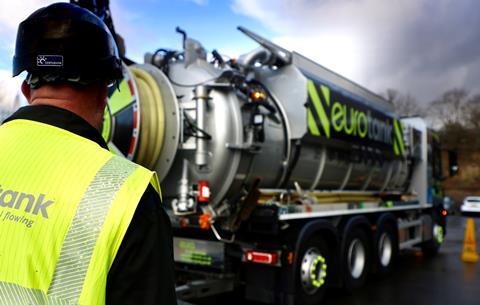
Interceptor cleaning
The Environment Agency recommends interceptors be cleaned every six months to prevent a build-up of silt and contaminants.
“Eurotank’s fleet of Rolba ADR tankers will provide a thorough clean of the interceptor – we won’t just skim a bit off the top – because the 16,000-litre barrel allows us to uplift the contents of interceptors as well as store the waste removed,” says Aplin.
The water storage tank and low-volume jetter also allows Eurotank to clean the drainage channels to ensure your site is as risk-free to flooding as possible.
The company’s interceptor cleaning tankers are operated by a two-man team so while one is uplifting the interceptor, the other could be busy cleaning any jet wash equipment you have on site to keep your valeting facilities looking clean and inviting, which helps customer retention. Engineers will chemically clean the jet wash machine and screens by hand and use the tanker to clear the wash pits and silt traps.
“There are plenty of synergies between our maintenance services so get in touch and we can discuss how best to combine tasks and keep your maintenance costs as low as we possibly can,” says Aplin.
“Electrical testing, for example, can be quite a disruptive service so it’s a good idea to complete it at a time when other disruptive works are taking place such as an annual pump meter audit and cutbacks, and pump filter and belt changes.
“Small fabric repairs such as dropped aco channels, manholes and bollards could all be fixed during a known annual planned preventative maintenance visit, too.”
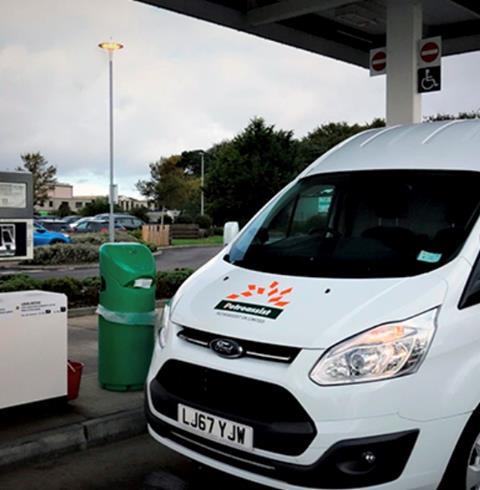
Safety in numbers
Barry Onions, head of sales at Petroassist UK, says anyone thinking about new pumps must also think about their maintenance. “Retailers may have purchased pumps in the past at an attractive price only to find out at a later date that spares are very difficult, if not impossible, to obtain meaning there are few or no options for maintaining the equipment. Safety in numbers is something to bear in mind as pump maintenance companies generally will not set up maintenance services for equipment that has a very small install base.”
And when it comes to considering an equipment maintenance contract, he says: “Just take a moment to consider this, one pump motor or tank gauge probe could cost you more than the average yearly service contract so is it worth taking that risk on your site?”
Petroassist UK’s engineers attend over 40,000 callouts a year and the main reasons for callouts are:
• Hanging hardware – nozzles and hoses get lots of wear and tear and need replacing after several years;
• Filters – with modern bio-content fuels filters need cleaning or replacing on a fairly frequent basis;
• VR2 Issues – these systems require period calibration and testing to keep them running correctly;
• Outdoor payment terminals – these can suffer wear and tear on touchscreens and printers that require routine maintenance.
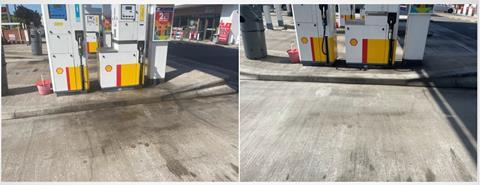
Clean and inviting
Aplin’s mention of making facilities look ‘clean and inviting’ is a very important one. Last year, NACS (National Association of Convenience Stores) 2023 Consumer Fuels Survey found that cleanliness was second only to safety in terms of why US shoppers chose a convenience store. And cleanliness must surely be important to shoppers here too.
Perry Paganelli, is vice president Europe of CAF, a company that provides cleaning product concentrates specially designed for forecourts and the difficult cleaning challenges associated with diesel and petrol. He says: “A clean forecourt creates a consistent and inviting first impression of the entire business and provides a differentiating customer experience to help drive repeat visits and customer foot traffic inside the stores for profitable food and beverage offerings.
“If a forecourt facility is filthy with concrete oil stains and dirty dispensers, nozzles and trash cans that reek of diesel fuel, customers – and particularly women customers – will make a negative snap judgement about the lack of cleanliness food preparation and quality inside the store as well. Who wants to buy a sandwich at a facility that is filthy when you pull up to the pump?”
He says best practice is to look at your site regularly through the eyes of your customers. “Diesel fuel is nasty dirty stuff, but with the correct safe, sustainable and effective cleaning products cleaning customer touch points (trash cans, dispensers, nozzles, etc) and concrete oil stains, can be accomplished in 10 to 15 minutes per day.”
Some forecourt owners or managers may be reluctant to do regular cleaning as it might mean shutting off parts of the business but Paganelli says there are forecourt product solutions available that require little to no down time and will keep forecourts looking good all year long with consistent use.
He recommends having a daily plan to make forecourt cleanliness a habit and stay consistent in the approach just as you would with your toilets. “Consistent forecourt cleanliness can be achieved in 10 to 15 minutes per day. We also suggest assigning a forecourt ‘Cleaning Captain’ who takes daily accountability for the way the dispensers, nozzles, trash cans and the concrete looks.”
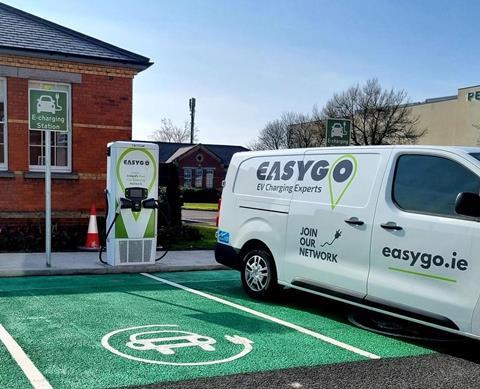
Don’t forget the EV charger maintenance
With more and more forecourts offering EV charging, chargepoint maintenance is vital too. David Cornish, head of product at Techniche, says: “EV chargepoint reliability is a critical issue as you want maximum uptime on your forecourt, the same as for any other revenue-making asset. But maintenance of chargepoints is still being overlooked. Operators, hardware, funding and grants are all important factors to consider when installing EV chargers but how best to maintain them is also something to add to the list, as you need to be able to offer the optimum customer experience.”
Cornish says some chargepoint platforms offer remote monitoring and maintenance as part of their package but it’s not comprehensive enough. “As a result, many operators are still logging breakdowns in a manual, error-prone process, using spreadsheets or a basic ticketing platform not designed for modern EV chargepoint maintenance management.
“On top of this there is a huge set of issues not managed or identified by charge station management systems – where everything appears to be working successfully but the customer experience is in fact poor – charging sessions that look to have completed successfully but are very short, delivered very little power, or did not achieve anywhere near the expected power rate.”
He says better confidence in the charging process can be gained from creating more effective maintenance processes which get faulty chargers up and running quickly. “A modern automated system removes the manual triaging and processing and automatically dispatches work orders to the right contractor – and in some cases performs the fix itself. This process takes seconds, not hours, days, or even weeks, which is currently the industry norm.
“Technology to automate the maintenance of EV chargers is vital to keep improving the reliability of the infrastructure and make sure drivers use your forecourt. Digital, automated processes help transform how quickly chargepoints are repaired, while analytics on the repair data deliver valuable insight into how reliable a chargepoint really is. This can help you make investment decisions in the future and choose the most robust equipment.”





















